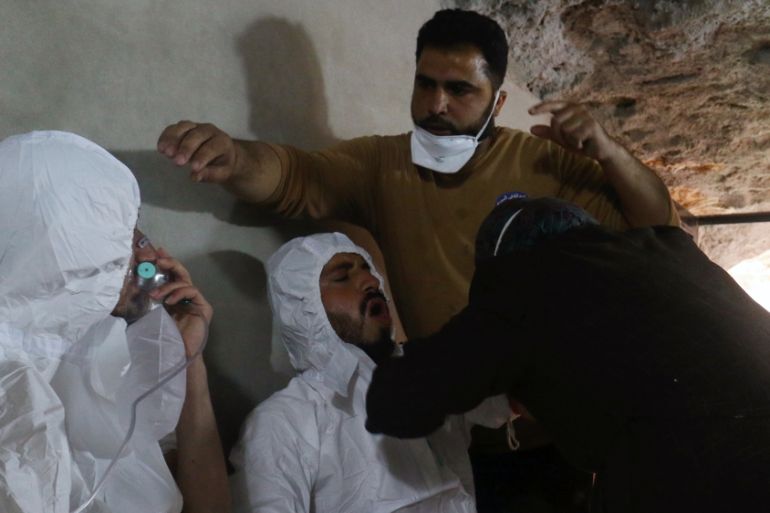UN Security Council meets on Syria ‘gas attack’
Diplomats meet in New York to discuss a suspected chemical attack in Idlib that killed at least 72 people.

The UN Security Council has met to discuss a suspected chemical weapons attack in Syria that killed at least 72 of people, including 20 children.
Britain, France, and the United States presented a draft resolution demanding a full investigation of the attack on a rebel-held town in Idlib province, but Russia defended its ally in Damascus and said the text was “categorically unacceptable”.
The draft resolution calls for a full investigation by the Organisation of the Prohibition of Chemical Weapons (OPCW) of the attack in the early hours of Tuesday in the town of Khan Sheikhoun.
If confirmed, the attack would be among the worst incidents of chemical weapons use in Syria’s brutal civil war, which has killed nearly half a million people and displaced half the pre-war population.
|
|
Images and video published shortly after the incident showed dozens of men, women and children gasping for air , convulsing, and foaming at the mouth.
“Experts who’ve dealt with the gas say all the symptoms seem to indicate that Sarin was involved,” Al Jazeera’s Alan Fisher, reporting from Beirut.
The World Health Organization said there was reason to suspect a chemical attack, with some victims displaying symptoms suggesting exposure to “a category of chemicals that includes nerve agents”.
Medical charity Medicins Sans Frontieres (MSF) said people it treated had symptoms consistent with nerve agents such as Sarin.
“MSF saw eight patients with symptoms – dilated pupils, muscle spasms, involuntary defecation – consistent with exposure to neuro-toxic agents such as Sarin,” the group said in a statement.
The Syrian Observatory for Human Rights, a Britain-based monitor, said at least 160 people suffered the effects of the gas.
The proposed measure requests the joint UN-OPCW investigative panel begin work immediately to identify the perpetrators of the attack.
The text also calls on Syria to provide flight plans, flight logs, and other information on its military operations on the day of the assault.
Damascus would be asked to provide the names of all commanders of helicopter squadrons to UN investigators and allow them to meet with generals and other high-ranking officials within five days of their request, the draft resolution said.
Syria would also allow UN and OPCW teams to visit air bases from which the attacks involving chemical weapons may have been launched.
READ MORE: ‘Chemical attack’ in Syria draws international outrage
Ahead of the emergency session on Wednesday, a spokeswoman for Russia’s foreign ministry said the draft resolution was “anti-Syrian”, adding it “pre-empts the results of an investigation and just immediately designates the guilty”.
Moscow, which launched a military intervention in 2015 in support of Assad’s forces, earlier defended Damascus against accusations of responsibility for the attack.
It said the deaths were caused when a Syrian air strike hit a “terrorist warehouse” used for making bombs containing “toxic substances”, and pledged to continue its military support for Assad.
|
|
Syria’s army has denied any use of chemical weapons, saying it “has never used them, any time, anywhere, and will not do so in the future”.
Syria’s permanent representative to the UN Munzer Munzer rejected what he called a “falsification of the facts” in Khan Sheikhoun, adding that “terrorist groups” had gained access to “toxic chemicals” with Turkish government assistance.
But Syria’s denials did little to quiet international condemnation, with UN chief Antonio Guterres on Wednesday saying the “horrific events” showed that “war crimes are going on in Syria”.
US Ambassador to the UN Nikki Haley said: “How many more children have to die before Russia cares?”
Haley hinted that in light of a UN failure to prevent such attacks, certain states may be “compelled to act” on their own.
READ MORE: How chlorine gas became a weapon in Syria’s civil war
In a statement to the Security Council meeting, France’s Ambassador to the UN Francois Delattre refuted arguments made by Russia and the Syrian government.
“There was no fire, even though such a strike [on an alleged chemical warehouse] would have caused a fire, and the consequences would have been much more serious for the civilian population,” he said.
UK Ambassador the UN Matthew Rycroft said the attack “bears all the hallmarks fo the Assad regime”.
“There’s only one air force that has used such weapons in Syria,” he said.
The Security Council meeting was adjourned without a vote scheduled as ambassadors continued negotiations privately.
|
|